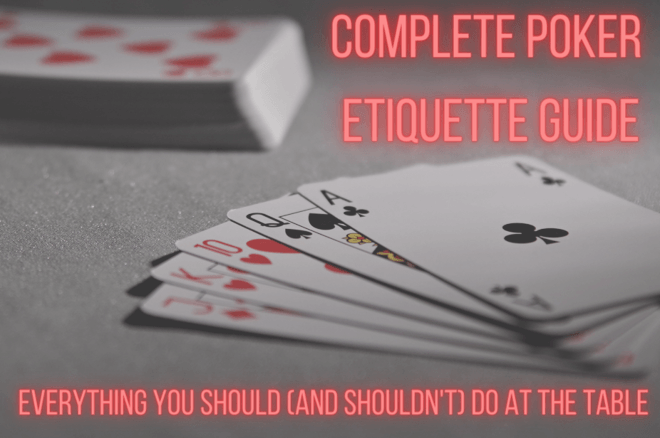Don’t slow roll or angle shoot, and please tip your dealer. There you go, that’s the whole gist of poker etiquette. Alright, that’s not true as there is far more to it that we’re going to discuss below.
You’ve probably heard poker players refer to something being “poor etiquette” at the poker table once or a million times. Perhaps the comment was made by someone who felt another player acted in a classless manner.
As you read this article and learn about standard definitions of poker etiquette, please understand that this isn’t a rule book, nor are we claiming to be poker’s moral police. We’re merely providing examples of what most within the poker community would consider to be proper.
With that out of the way, let’s get started.
Poker Dealer Tipping 101
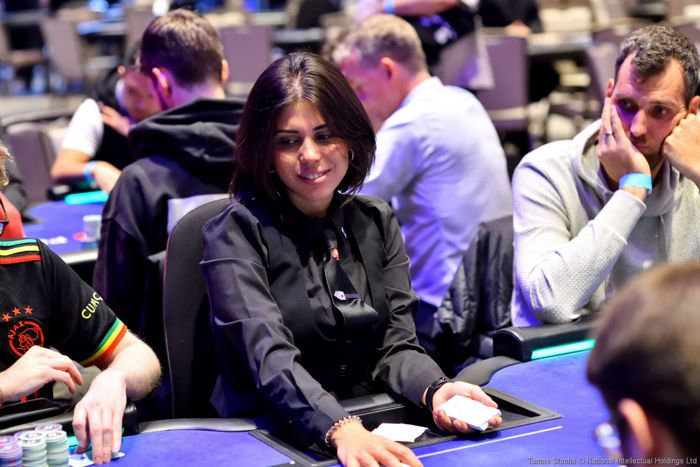
In some countries, tipping can be considered an insult. In others, it’s not only expected but workers sometimes depend on them. Similarly, in some industries a tip will be met with an appreciative, yet confused look, while in other areas of society tipping helps to sustain the working ecosystem. So, what is the tipping situation in poker and how much should you tip dealers?
Should You Tip in Poker?
Yes, typically you should tip in poker. Poker dealers are similar to servers and bartenders in that they rely more on tips from customers than the low-wage salary their employer pays, at least in the United States and some other countries. In nations such as the US where businesses can get away with paying service industry workers a mediocre hourly rate, it’s imperative that you tip your dealer in cash games, and also when you cash in a tournament.
Understandably, there are those who are none too thrilled to tip a dealer, especially pros who realize that the more they tip, the less they will profit from a session. But without dealers, you won’t have anywhere to play. And if you don’t tip, dealers will continue to find different occupations that pay the bills.
So, tip generously, but that doesn’t mean you have to hand over your entire stack to a dealer. There is no rule on how much to tip, but standard poker etiquette would say tip at least $1 per pot you win, and more for big pots.
While we’re on the subject of poker dealers, treat them with respect. It’s not the dealer’s fault the donkey in Seat 9 hit a gutter ball on the river to crack your two-pair. You shouldn’t have limp three-bet under the gun with six-five off-suit in the first place.
Be good to dealers. If they make a mistake, let them know in a polite manner, or ask them to call the floor manager over to correct the problem. Dealers are as important to the success of this game as anyone, so take good care of them so we don’t scare all the good ones away.
How Much Should You Tip a Dealer?
Slow Rolling and Angle Shooting
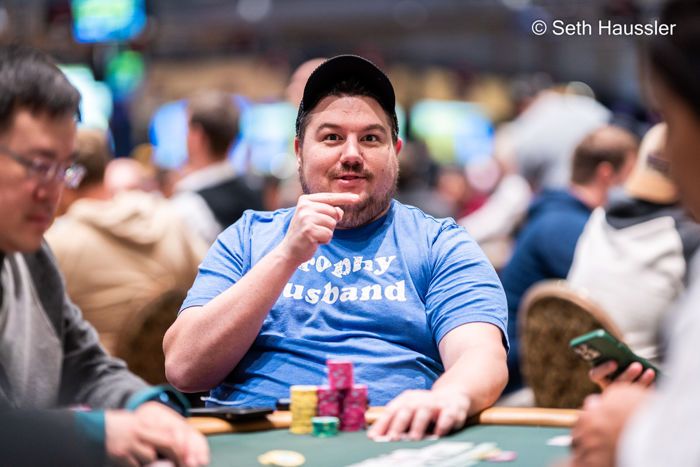
Most poker players believe that slow-rolling an opponent is uncalled for, or even classless. If you’re doing it to a friend or someone you know won’t take offense to the slow roll, by all means, go for it. Otherwise, it’s probably best to just turn your cards over at showdown when you know you have the best hand. But what exactly is angle shooting, what is slow rolling, and why are they so frowned upon in poker?
What is Angle Shooting in Poker?
Angle shooting is, more or less, a legal way of obtaining information from an opponent in a scummy manner. Those who angle-shoot are frowned upon in the poker community. Just ask Alec Torelli, a fairly prominent poker player back in 2017 before being called out by Doug Polk on his YouTube channel for allegedly angle-shooting during a Poker Night in America stream.
Torelli’s reputation took a severe hit because of the Polk video. There are many ways to angle-shoot, all of which are major no-nos in poker. One example of a common angle shoot is to begin to make a calling motion when facing a bet but then pull your chips back before they cross the betting line. The purpose of that type of move is to gain information from the opponent about the strength of their hand.
“Slow rolling in poker is intentionally taking longer than needed to make an action in poker where, realistically, there is no other choice to be made.”
Is Angle Shooting Allowed in Poker – Is It Bad to Angle Shoot?
Angle shooting is allowed in poker, although it is considered bad to do so and some card rooms could issue a penalty, especially in a tournament, and your table mates will criticize you for making that move. Another type of angle shoot, and this is what Torelli was alleged to have done, is to intentionally hide the large denomination chips in your stack so that your opponent can’t see them and is under the impression your stack is shorter than it really is.
What is Slow Rolling in Poker?
Slow rolling in poker is intentionally taking longer than needed to make an action in poker where, realistically, there is no other choice to be made. For instance, if you have the nuts and are calling an all in, this action should be instant. You cannot lose the hand and if there’s nobody behind you, tanking brings no benefit whatsoever.
Is Slow Rolling Allowed in Poker – Is It Bad to Slow Roll?
Yes, slow rolling is allowed in poker, however, it is bad to do so and you should not do it at the table. Most poker players believe that slow-rolling an opponent is uncalled for, or even classless. If you’re doing it to a friend or someone you know won’t take offense to the slow roll, by all means go for it. Otherwise, it’s probably best to just turn your cards over at showdown when you know you have the best hand. Here’s a classic example of a Shaun Deeb slow-roll of Mike Matusow that you shouldn’t copy.
While everyone loves Deeb — okay, maybe not everyone — he may not be the prime example of poker etiquette. That’s not to say the perennial World Series of Poker (WSOP) Player of the Year contender isn’t a good dude or lacks morals. Far from it. But his penchant for slow rolling his opponents is frowned upon by many within the poker community.
Table Talk: What You Can and Can’t Say at the Poker Table
Despite the odd table where everyone has their hoods up, sunglasses on, and headphones firmly in their ears, there’s usually a bit of conversation at the poker table. But what is okay to talk about, when is it not okay to talk, and are there any things you definitely should not say?
Avoid Controversial Topics
There’s a time and a place for any type of conversation, but some are best kept away from the poker table. Take, for example, politics. Most people have strong political beliefs, but the fact of the matter is hardly anyone has even the slightest ability to be objective on this topic.
Conversation at the poker table should remain civil, and that’s difficult to accomplish when politics come up given that these days most people live in echo chambers and cannot control their emotions when someone else has the audacity to have different political views.
No one wants to listen to a couple of biased political know-it-alls having a pointless heated discussion while trying to enjoy a game of poker, especially considering we all know these debates never lead to anyone involved changing their minds.
“Not only is it a poor strategy to encourage other players to play better, but it’s also just plain rude. You play your game, they can play their game.”
Berating Opponents and Using Abusive Language
Sparking political debate is far from the only way to show poor etiquette at the poker table. Another way to disgrace the game is by berating opponents. Going even further, criticizing the play of another player when you weren’t even in the hand is just bad form.
Not only is it a poor strategy to encourage other players to play better, but it’s also just plain rude. You play your game, they can play their game. If you lose a pot to an opponent who simply got lucky and played the hand poorly, why complain about it? You should want your opponents to play like donkeys because you’ll make money in the long run.
Plus, there’s just no need for that type of behavior at the table (sorry, Phil Hellmuth). If you need an example of the type of professionalism you should mimic at the poker table, start with Phil Ivey, Phil Galfond, Chance Kornuth, Maria Ho, and many others who never berate players even following a brutal bad beat.
You don’t have to become BFFs with your table mates. In fact, you don’t even have to like them, but there’s simply no need for taunting, insulting, and berating other players.
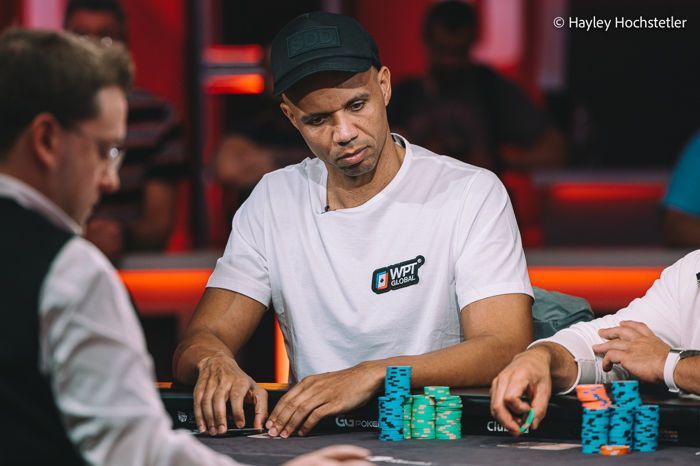
Tanking and Acting Out of Turn
Tanking isn’t black and white when it comes to poker etiquette – some spots are more suitable than others to tank. On the other hand, acting out of turn is never okay when done intentionally. Here’s what tanking is in poker, what acting out of turn is and when it’s okay to do so.
What is Tanking?
Tanking is the act of taking a long time to make a decision at the table. For instance, let’s say you make a set on the river, but there’s also a four-card straight out there as well. If the pot is already a big one, your river decision of whether to raise for value, raise as a bluff or just check and hope it goes to showdown is a tough one. So, although tanking often carries a certain stigma with it, it’s sometimes perfectly reasonable to take a while to make a decision if the spot you find yourself in is particularly difficult.
“Most recreational players are put off by pros who take forever and a day to act.”
Is Tanking Allowed in Poker?
Tanking is allowed in poker, as it’s entirely subjective in most spots as to how long a player should take to act. So, how long should you take to act? That all depends on the situation. There are certain instances in which tanking is perfectly acceptable. Take, for example, facing a huge all-in shove with a big but beatable hand. In that spot, you have every right to pause for a while to make a decision.
However, unless a shot clock is in place, there technically is no set rule for how long a player has to act when facing a decision. But most recreational players are put off by pros who take forever and a day to act.
Tanking is a problem in poker because it makes the game less enjoyable for casual players. Scaring off recreational fans is about the worst thing that could possibly happen to the poker ecosystem.
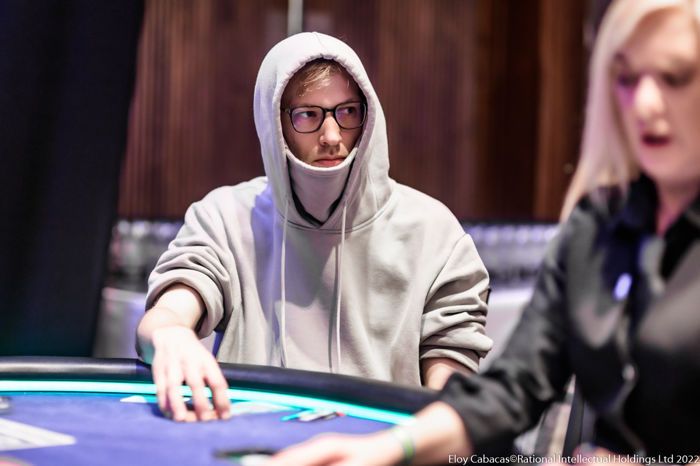
But if you’re under the gun with seven-deuce preflop, just throw your cards in the muck. Don’t sit there twiddling your thumbs for 30 seconds before doing the inevitable — folding. There isn’t a set amount of time to act that is right, so use your best judgment. It’s okay to pause for a brief moment before making a call or raising so as to not give off any tells. Just don’t make everyone wait all afternoon when you already know what you’re going to do.
That said, calling the clock on a player facing a difficult decision in a huge spot is also poor etiquette. You should only call the clock on habitual tankers who are wasting everyone’s time.
Christoph Vogelsang Ripped for Tanking
What is Acting Out of Turn?
Acting out of turn means making a decision in a hand before it is your time to act. For instance, if you look down to see the dreaded 27 off-suit, you know you’re going to fold, but you still need to wait until the action gets around to you to do so. Players who act quickly are appreciated in poker but it is poor etiquette to fold, call, or raise before action is on you. That’s because doing so can give another player an unfair advantage.
“Do unto others as you would like them to do to you, or something like that.”
For example, let’s say a player with the nuts bets out on the river in a three-way pot. Action is on the player in middle position who is pondering a call with a marginal hand. Before making a decision, the third player announces “call,” which convinces the middle position player to fold assuming their hand can’t beat two other hands.
In this situation, the player with the nuts would rightfully be upset given they lost out on some money. You’d hate if this happened to you, so don’t do it to someone else. Do unto others as you would like them to do to you, or something like that.
A Few More Poker Etiquette Tips
Personal Hygiene
This goes without saying, but sadly many don’t seem to follow this poker etiquette rule: Please take a shower before you arrive at the poker room. No one wants to sit next to a sweaty mess who smells like they haven’t showered since the Bush administration.
Pay Attention
Another tip is to avoid slowing down the game by failing to pay attention to what’s going on. This goes beyond just tanking. Some players don’t intentionally take forever to act. They’re busy watching the ballgame on TV or chatting it up with another player and don’t realize when action is on them. Doing so slows down the game and frustrates everyone else at the table.
Eating at the Table
One last piece of advice on the poker etiquette topic is to, at the very least, wipe your hands before touching the cards and chips if you’re eating at the table. Many players will eat while playing, although some don’t like it. If you do eat during a poker game, especially if you’re stuffing your face with a greasy burger or some saucy chicken wings, have plenty of napkins handy.
So, there you have it — a complete guide to poker etiquette. You’ll be a delight to play with if you follow the above rules.
